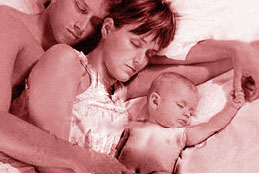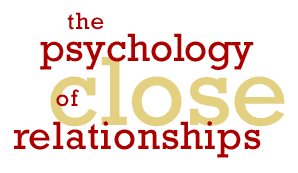It's About Attachment Again
In Lesson 4 we discussed the idea of attachment, and of secure, avoidant and insecure attachment styles.
The ability to allow yourself to feel close and attached to another seems to have its roots in early childhood relationships. It is hardly surprising that people whose
relationships with their parents and other key adults are or were relatively close, and who felt loved unconditionally tend to approach
intimacy and commitment with a more positive set of expectations than do those whose relationships with their parents and other key adults
were more problematic. Similarly, if a child's parents don't have a particularly loving relationship, he or she will have few models for
intimacy and plenty of reasons to fear relationships.
If a child finds his or her love for his parent(s) is manipulated ("Mommy is going to be really disappointed in you if you don't wear
the blue shirt I bought,") love takes on the qualities of a weapon, one the child may soon learn to use: "Stay away from me! I don't
love you anymore!" If this leveraging of love is a standard pattern, future relationships are likely to reflect such manipulation.
As feelings of love arise, feelings of threat and impending manipulation are likely to arrive right on their heels. Or the drama may play out
differently. The child may become anxiously attached, always fearing that love will be withdrawn and needing constant reinforcement.
Psychologist Sid Simons created the following dialogue to illustrate how this dynamic can work between two partners, one with a more
normal attachment style and self esteem and the other with a anxious attachment style and corresponding lower self-esteem:
Low: "Do you love me?"
Normal: "Yes, I love you."
L: "You really, really love me? You're sure?"
N: "Yes, I really, really love you!"
L: "So do you know what 'love' is?"
N: I don't know -- maybe not. . ."
L: "Well, if you don't know what love is, how can you be sure you love me?"
N: "I don't know, maybe I can't . . ."
L: "You've been building up to this for a long time, haven't you?"
So, what are we to do with this type of information? Are we doomed to act out the same old family drama in our intimate
relationships? Clinging too much if we are insecurely attached, running away at the first sign of difficulty if we are avoidant?
Fortunately, we are thinking (and feeling) beings and though we can't reason away ingrained attachment patterns, there are ways to begin to
short-circuit these responses. We will need to pay careful attention to the benefits and costs of our intimate relationships and
become more aware of the ways our own and our significant other's attachment patterns can affect our intimate relationships.
Love's Balance Sheet
In the movie Kramer vs. Kramer, Dustin Hoffman plays a difficult man whose despairing wife (Meryl Streep) has left him to
raise their young son. Struggling to deal with single parenting and trying to decide whether he should keep custody, the stressed father
tries to make an objective list of the pros and cons of keeping his son. Contrary to his obvious delight in his son, he has difficulty
thinking of the advantages but no trouble listing the problems and disadvantages, racing to list them as soon as he can think of them.
Finally, he sums up the cons column in one phrase: "No let-up!" For emphasis, he underlines it several times.
The scene is poignant but also ironic: We know Kramer loves his son and does enjoy parenting. Somehow, the pros must outweigh the
cons, however frustrating the "no let-up" reality may be. And who, in real life, draws up such a list to decide whether to stay or go?

Try a related exercise before you go on. First think of your current relationship and partner. If you are not presently in a
close romantic relationship, consider your closest friendship or a past relationship. Then list the:
Pros: What are/were the major rewards you experience because of this
relationship? What do you get out of it? What does intimacy give you? What does your partner offer? What would you miss if
the relationship were ended?
Cons: What are the major costs of being in this relationship? Relating to this particular person? What must you offer to your partner that you
might not otherwise be willing to give or give up? What would you gain if this relationship were ended?
The purpose of this exercise is not just to try to get to a cost-benefit analysis but to see if you tend to over-emphasize the
negative or the positive. Sometimes our fear of intimacy is such that we are inclined to focus on the negatives as a way of keeping
our tender feelings at bay. Suppose Peter has been spending time thinking about what he doesn't like about Tory. He could probably
get himself pretty worked up about how grating her laugh is or how pushy she is. He may be starting to think he doesn't love her
because he has these thoughts. But he may be focusing on the costs just to rescue himself from his desire to avoid attachment and make a
commitment. But there may be more to it than that and, in fact, there often is. Tory may be a little pushy. Her somewhat anxious
attachment style may be making it harder for Peter to look at his feelings.
Beware of the Big Yellow Taxi
In her song, "Big Yellow Taxi," Joni Mitchell observed, "Don't it always seem to go/That you don't know what you got till it's gone?."
In a very familiar relationship, it may be hard to realize what you gain but still not pleasant think about what you would lose if you lose the relationship. Likewise,
reminding yourself of the costs -- what you are missing or losing by being in a relationship -- you are pretty much guaranteed to make
yourself feel dissatisfied. There are bound to be costs. If you are focusing only on them, as Peter is tending to do, you will succeed in
feeling deprived.
Fortunately, one of our major resources as a species is our big neocortex (the "thinking layer" of the brain). With it, we can also
imagine the future without our special other. And such imaginings can even reassure us that our relationship is the best situation we
might have. The key is balance: If you dwell on costs, be sure to remember the benefits -- and vice versa.
So what did you come up with in the exercise above?





